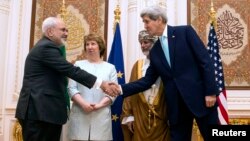Iran, the United States and the European Union have wrapped up two days of talks in Oman without any noted breakthrough on a comprehensive nuclear agreement with Tehran.
Iranian Foreign Minister Mohammad Javad Zarif, U.S. Secretary of State John Kerry and European Union envoy Catherine Ashton were trying to reach a deal Monday, ahead of the looming November 24 deadline for a pact.
Heading into Monday's evening session, Zarif voiced hope for progress "eventually." He later told Iran's Press TV that a joint news conference had be canceled, with "no clear breakthrough" in negotiations.
U.S. President Barack Obama said in a televised interview Sunday that the sides are still far apart in reaching an accord. The meeting in Oman was the Obama administration's best chance to push forward a nuclear deal with Iran before skeptical Republicans take control of the U.S. Congress in January.
The key points of contention are the number and type of uranium-enriching centrifuges Iran will be allowed to keep spinning, the scope of outside inspections if a deal is reached and the pace of the West lifting debilitating economic sanctions against Tehran.
Speaking before departing Beijing on Saturday, Kerry said there are "real gaps" in talks to reach an agreement with Iran on its nuclear program. He also stressed that the nuclear negotiations are separate from other issues, including possible cooperation with Iran in the fight against Islamic State militants in Iraq and Syria.
Zarif, who also spoke ahead of the first day of talks on Sunday, said sanctions imposed by the West will not provide a solution to the standoff over Iran's nuclear program.
President Obama said recently the U.S. and other members of the P5+1 (Britain, China, France, Russia, the United States and Germany), have given Iran a framework for a nuclear agreement.
He called the framework a step-by-step verifiable way for Iran to get out from under crippling sanctions and rejoin the international community. But the president called it an "open question" whether the Iranian leadership will do what is best.
The P5+1 wants Iran to curb its uranium enrichment abilities to keep it from being able to build a nuclear bomb. In exchange, the U.N. would lift economic sanctions.
Iran has consistently denied wanting to build nuclear weapons.





